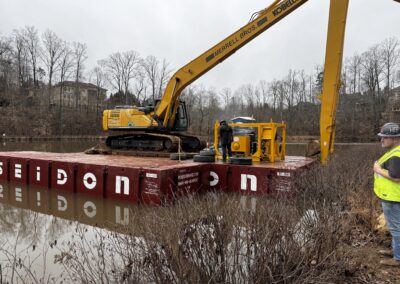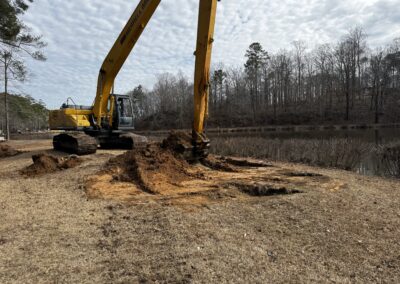Cary, North Carolina
Project Location: City of Cary, NC
Owner: H.G. Reynolds & The Town of Cary, North Carolina
Address: Symphony Lake, Cary, NC
Year project was performed:
Project Started in January 2024 | Project Completed in April 2024
Merrell Bros. performed both Mechanical & Hydraulic Dredging to remove sediment from the lake, as well as Belt Press Dewatering to separate excess water from the sludge. Given the density and sediment characteristics, the sediment will be excavated with a very innovative floating barge system.
Dredging Explained
Dredging a lake plays a vital role in maintaining ecological balance, ensuring proper water management, and supporting various human interactions and activities. It addresses issues related to sedimentation, erosion, water quality, and infrastructure maintenance, contributing to the overall health and sustainability of the lake ecosystem.
Belt Press Dewatering Explained
Dewatering biosolids is a process that involves removing excess water from the sludge or solid byproduct withdrawn from Symphony Lake during the dredging process. Biosolids are the organic materials remaining after the excess what has been removed. The dewatering process is essential for reducing the volume and moisture content of biosolids, making them more manageable, transportable, and environmentally sustainable. Merrell Bros will be using the Belt Press dewatering process designed to separate water from the solid components of biosolids.
The key objectives of dewatering biosolids include:
Environmental Benefits: Dewatering contributes to environmental sustainability by minimizing the environmental footprint associated with the handling and disposal of biosolids. It helps in complying with regulations and promoting responsible wastewater management practices.
Resource Recovery: Dewatered biosolids, once processed, can be used as a valuable resource. They are often reused as fertilizers in agriculture due to their nutrient-rich content. This recycling aspect contributes to a circular economy approach, turning waste into a beneficial product.
In summary, dewatering biosolids is a critical step in the overall wastewater treatment process. It enhances the efficiency of biosolid management, reduces environmental impact, and allows for the responsible reuse or disposal of the treated materials.



